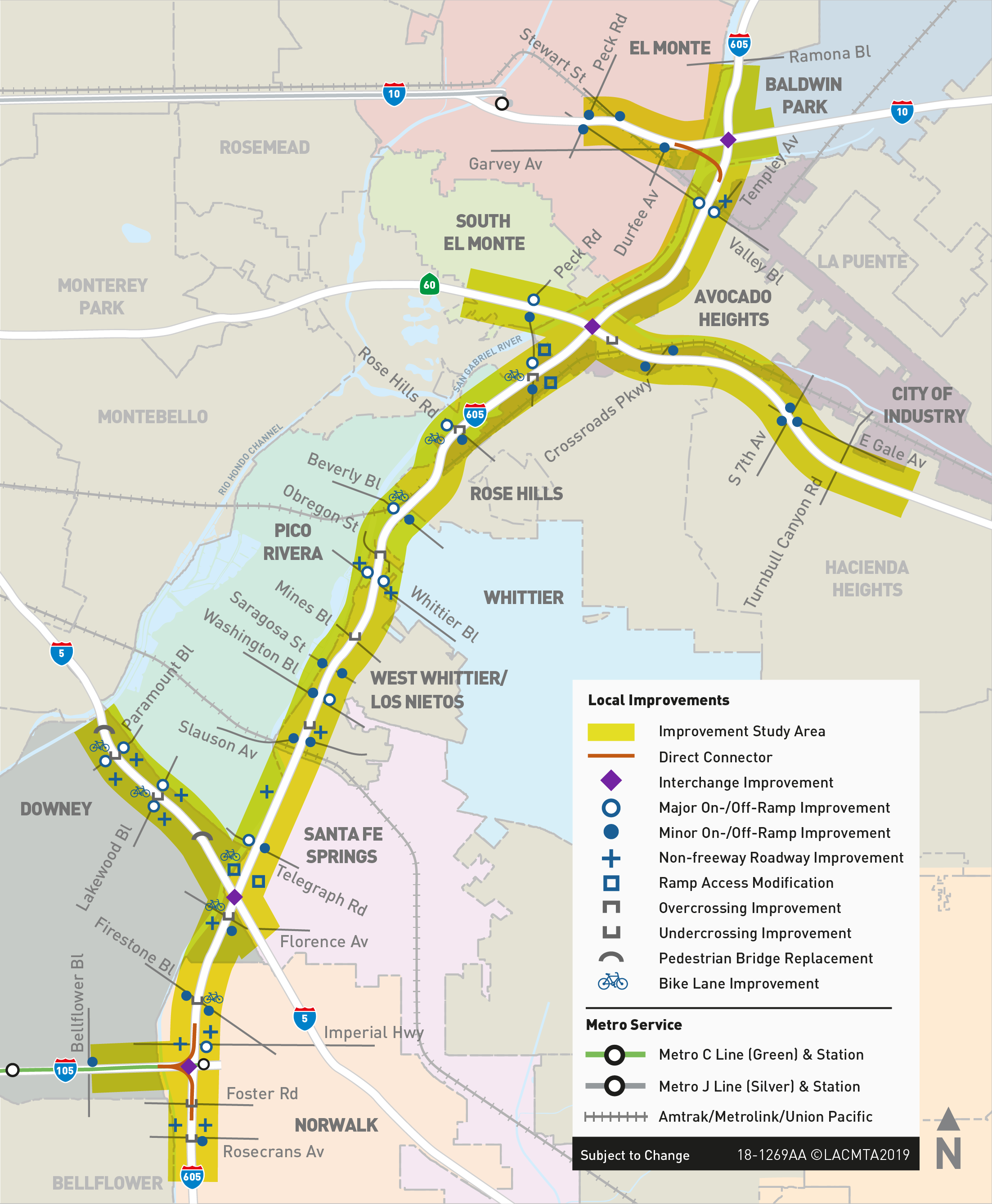Earlier today, the Metro board unanimously approved a motion to delay its 605 Freeway Corridor Improvement Project, and to study alternatives that would minimize the demolition of homes.
Metro and Caltrans' 605CIP would add four new lanes to about twelve miles of the 605 Freeway from Norwalk to El Monte. The project would also add capacity to portions of the 5, 10, 60, and 105 Freeways. In August, Metro announced that the 605CIP would impact more than 1,200 properties - some full acquisitions, some partial acquisitions, and some easements - including more than 200 homes along the 5 Freeway in the city of Downey. The project's large-scale demolition of homes was initially questioned by the Gateway Cities Council of Governments (GCCOG) in early September. In mid-September Downey City Council candidate Alexandria Contreras sounded the alarm about Metro taking out homes in the neighborhood where she grew up. After Contreras' concerns went viral, the city of Downey came to oppose the project.
To date, Metro's official statements, including a September 29 letter from CEO Phil Washington, have been largely dismissive of GCCOG and community concerns.
But the Metro board listened.
Last week, six boardmembers put forth a motion that delays the release of the project environmental studies (draft Environmental Impact Statement/Environmental Impact Report - dEIR/EIS) until after Metro staff study more alternatives. The motion specified that those alternatives will include one that "minimizes right-of-way impacts" and/or a "Transportation System/Demand Management (TSM/TDM) alternative" similar to what the board approved in place of the canceled $6 billion North 710 Freeway tunnel project through South Pasadena.
Metro had announced that its already-completed dEIR/EIS would be released in September 2020, then delayed the release until early 2021. The motion further delays the release until after Metro's alternatives report is completed.
In addition, the motion commits Metro, including Metro's Executive Officer of Equity and Race, to doing more outreach with corridor stakeholders.
Discussion at today's board meeting showed widespread board sentiments in opposition to the project. Among the boardmembers expressing concerns were:
- Long Beach Mayor Robert Garcia already voiced his opposition to "taking people’s homes in order to widen a freeway” and instead proposed 605CIP funding go to other purposes in corridor cities. Today Garcia repeated that sentiment, and further emphasized that all Metro highway projects need to adhere to Metro equity policies.
- County Supervisor Hilda Solis expressed opposition to demolishing homes during a housing crisis. She shared that she had received forty letters in opposition to the 605CIP. Solis represents the majority of the 605CIP project area, though her district ends in Pico Rivera, just a few blocks north of the Downey homes that Metro plans to demolish.
- County Supervisor Janice Hahn, who represents the Downey homes Metro would demolish, remarked that freeway widening projects are "inherently controversial" and therefore Metro needed to be more transparent in sharing project information with impacted communities. Hahn also brought up equity, and noted that she too had received many letters opposing the project.
- Duarte City Councilmember John Fasana acknowledged past issues with freeway widening, noting the trade-offs between housing and freeway capacity.
- Glendale City Councilmember Ara Najarian recalled his opposition to the North 710 Freeway tunnel, noting that he sees the "same fight in Downey." He supports a TDM alternative, similar to what Metro did instead of the 710 tunnel.
- L.A. City appointee Jacqueline Dupont-Walker recalled that past freeway expansion had decimated communities.
Public comments voiced today were also similarly opposed to the 605CIP. Downey City Councilmember Sean Ashton commented that destroying "250 homes" was "not the right thing for Downey." Representatives from the Alliance for Community Transit (ACT-LA) decried the project's impact on housing and the environment.
Per the motion, the next steps on the 6o5 Corridor Improvement Project will be a January 2021 status update report to the Metro board's Planning and Programming Committee, then an April 2021 final alternatives report.
SBLA San Gabriel Valley coverage, including this article and SGV Connect, is supported by Foothill Transit, offering car-free travel throughout the San Gabriel Valley with connections to the new Gold Line Stations across the Foothills and Commuter Express lines traveling into the heart of downtown L.A. To plan your trip, visit Foothill Transit. “Foothill Transit. Going Good Places.”
Sign-up for our SGV Connect Newsletter, coming to your inbox on Fridays.





